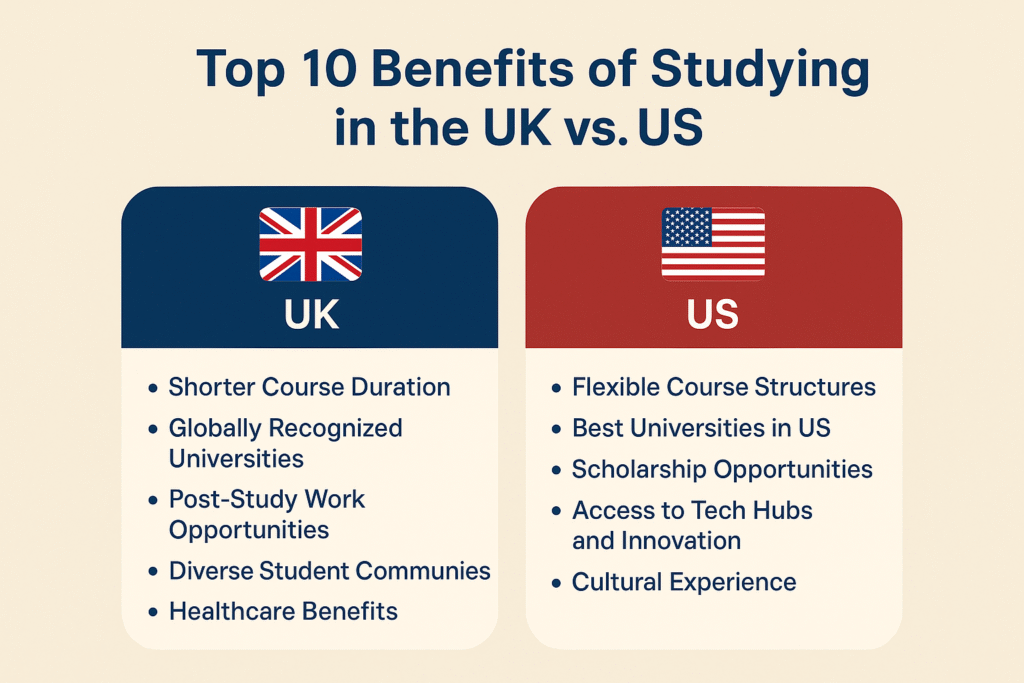Choosing where to study abroad is one of the biggest decisions of your life. If you’re stuck between the UK and the US, you’re in good company—these two countries consistently rank as top destinations for international students.
But which one is better for you?
In this detailed guide, we break down the Top 10 Benefits of Studying in the UK vs. US, compare costs, lifestyle, career opportunities, and more—so you can make an informed choice that aligns with your academic and professional goals.

📚 1. Course Duration: UK Is Quicker to Graduate
One of the most significant advantages of studying in the UK is its shorter course duration.
- UK Degrees:
- Bachelor’s: 3 years
- Master’s: 1 year
- US Degrees:
- Bachelor’s: 4 years
- Master’s: 2 years
This means less tuition fees and lower living expenses, which can save you up to a year’s worth of costs. For students focused on entering the workforce faster or pursuing higher studies, the UK has a clear edge.
🎓 2. Academic Excellence & Global Rankings
Both the UK and the US boast top-ranking universities known for academic excellence:
- UK: University of Oxford, Cambridge, Imperial College London, LSE
- US: Harvard University, MIT, Stanford, Yale
The UK focuses more on subject-specific depth, while the US offers a more holistic education with broader electives and a flexible curriculum.
Both are excellent, but your preference depends on whether you want to explore different fields (US) or specialize early (UK).
🧠 3. Flexibility of Course Structure: US Has the Upper Hand
The US education system is incredibly flexible. You can take a variety of courses before declaring your major—ideal for students who are still figuring things out.
In contrast, the UK curriculum is more rigid, with students diving into their chosen major from day one. This is great for focused learners, but not ideal if you’re still exploring your path.
💼 4. Post-Study Work Visas: UK Is Easier to Navigate
Both countries allow international students to work after graduation, but the UK’s process is more straightforward:
- UK Graduate Route: Stay and work for 2 years (3 years for PhD)
- US OPT (Optional Practical Training): 1 year for all students, 2 extra years for STEM grads (total 3 years)
While the US has more job opportunities in sectors like tech and finance, getting a long-term visa in the US can be challenging due to the H-1B lottery system. The UK offers a smoother path to permanent residency for skilled graduates.
🎓 5. Scholarships and Financial Aid
Let’s be honest—studying abroad isn’t cheap. But both the UK and US offer excellent scholarship options:
- UK Scholarships:
- Chevening Scholarships
- Commonwealth Scholarships
- University-specific grants (e.g., University of Edinburgh Global Scholarships)
- US Scholarships:
- Fulbright Program
- Need-based aid at Ivy League schools
- Merit-based awards at state universities
The US offers more generous financial aid, especially for undergraduate students, while the UK has more targeted scholarships for postgraduate students.
🌍 6. Student Diversity and Cultural Exposure
Both countries attract students from around the world, creating vibrant and diverse communities. However:
- The UK is more compact, making it easier to travel and connect with people from various cultures quickly.
- The US offers a larger variety of university campuses, from urban hubs to small-town settings, each with its unique culture and vibe.
Either way, you’ll experience cultural immersion, language improvement, and personal growth—the core reasons why international students study abroad in the first place.
✈️ 7. Geographic Advantage: Europe vs. Tech Hubs
- Studying in the UK means easy access to Europe—you can explore Paris, Berlin, and Rome in just a weekend trip.
- In the US, you’re closer to global tech hubs like Silicon Valley, Wall Street, and Hollywood, making it ideal for careers in technology, finance, and media.
So whether you’re a travel junkie or a tech enthusiast, your choice may come down to location and opportunity.
🏥 8. Healthcare Access: UK Wins with NHS
In the UK, international students pay a health surcharge (around £470/year) and get access to the NHS (National Health Service), which covers most healthcare needs.
In the US, health insurance is mandatory, but it can cost anywhere from $500 to $2,000 per year, depending on your coverage and location.
So, if healthcare is a priority, the UK offers better value and peace of mind.
🏛️ 9. Rich History vs. Modern Innovation
- The UK offers an incredible mix of historical landmarks, royal culture, and literary heritage.
- The US thrives on innovation, diversity, and modern lifestyles—from Silicon Valley startups to New York fashion.
Your lifestyle preferences—be it classical charm or fast-paced innovation—could help tilt the balance.
👨💼 10. Career Growth & Long-Term Prospects
Career pathways after graduation are vital. The UK recently improved its visa and immigration policies, making it easier for international students to transition from student visas to work visas and even PR (Permanent Residency).
In contrast, the US requires employer sponsorship, and PR is a long and uncertain journey through the H-1B and Green Card process.
UK is more accessible for long-term settlement, especially post-Brexit as it looks to attract global talent.
🧾 Frequently Asked Questions (FAQ)
Is the UK cheaper than the US for international students?
Yes. Due to shorter course durations and lower living costs, studying in the UK is generally more affordable.
Can I work while studying in the UK or US?
Yes. Both countries allow part-time work:
UK: Up to 20 hours/week during term
US: Up to 20 hours/week on-campus (off-campus only after 1st year with permission)
Which country has better job opportunities after graduation?
The US has more job opportunities, especially in STEM fields, but the UK has a simpler post-study work visa process.
Which country is safer for international students?
Both are generally safe. University campuses in both the UK and US have strong safety protocols, though location matters.
Can I apply for PR after studying?
UK: Easier transition from student to skilled worker to PR
US: More complex, relies on sponsorship and lottery systems
🏁 Conclusion: UK vs. US – Which Is the Right Choice for You?
If you’re looking for a shorter, cost-effective education with easier visa rules, the UK is an excellent choice. It’s perfect for students who know their academic path and want to enter the workforce quickly.
If you value academic flexibility, a diverse campus life, and want to explore various career paths, the US might suit you better. It’s ideal for students who enjoy the idea of a broader, liberal arts-style education.
Both countries offer world-class education, so the right choice depends on your goals, budget, career plans, and personal preferences.









